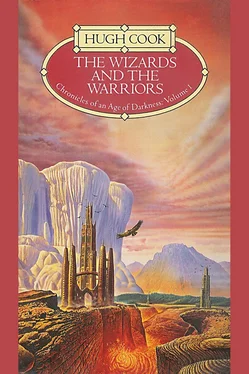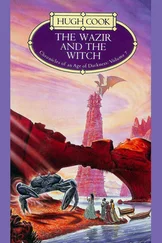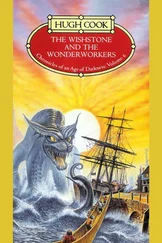Hugh Cook - The wizards and the warriors
Здесь есть возможность читать онлайн «Hugh Cook - The wizards and the warriors» весь текст электронной книги совершенно бесплатно (целиком полную версию без сокращений). В некоторых случаях можно слушать аудио, скачать через торрент в формате fb2 и присутствует краткое содержание. Жанр: Фэнтези, на английском языке. Описание произведения, (предисловие) а так же отзывы посетителей доступны на портале библиотеки ЛибКат.
- Название:The wizards and the warriors
- Автор:
- Жанр:
- Год:неизвестен
- ISBN:нет данных
- Рейтинг книги:5 / 5. Голосов: 1
-
Избранное:Добавить в избранное
- Отзывы:
-
Ваша оценка:
- 100
- 1
- 2
- 3
- 4
- 5
The wizards and the warriors: краткое содержание, описание и аннотация
Предлагаем к чтению аннотацию, описание, краткое содержание или предисловие (зависит от того, что написал сам автор книги «The wizards and the warriors»). Если вы не нашли необходимую информацию о книге — напишите в комментариях, мы постараемся отыскать её.
The wizards and the warriors — читать онлайн бесплатно полную книгу (весь текст) целиком
Ниже представлен текст книги, разбитый по страницам. Система сохранения места последней прочитанной страницы, позволяет с удобством читать онлайн бесплатно книгу «The wizards and the warriors», без необходимости каждый раз заново искать на чём Вы остановились. Поставьте закладку, и сможете в любой момент перейти на страницу, на которой закончили чтение.
Интервал:
Закладка:
The enemy wavered.
Now was the moment!
Hearst turned to face the thousands of bowmen hiding behind the mound. Their missiles exhausted, they stood silent, fearful, waiting. He waved them forward: 'Charge!' shouted Hearst.
They wavered, unsure, uncertain.
He waved them forward again: 'Charge! Charge!'
Slowly, they began to move. Up the burial mound they came. Then, reaching the top, they saw the enemy army starting to break up as men began to flee before the remorselessly advancing infantry, spurred by rumours of the death-stone and the unknown terrors of the ships now outflanking them.
With a great shout, Hearst's archers surged forward: 'Wa – wa – Watashi! Wa – wa – Watashi!'
Watashi.
Blood. Fear. Death.
That shout was the loudest thing on the battlefield. To the men in Alish's army, it seemed as if Hearst had suddenly found another five thousand troops to commit to the battle. At the distance, they could not see the shouting was from a mob of civilians who did not even have arrows left for their bows. That shock turned hesitant retreat into all-out rout.
The five thousand began to move forward.
'Hold fast!' shouted Hearst. 'Hold fast!'
But it was useless. They were out of control. They surged down the mound, floundered through the mud, and pillaged the dead, seizing swords, spears and knives, and retrieving their own arrows. Then, screaming – their voices hoarse by now – they went on the attack: 'Wa – wa – Watashi!' Hearst turned to Farfalla. 'I can't stop them!' he said.
'Let them go,' said Farfalla. i think they're safe enough; I think the pirates can run faster than they can.'
And Hearst, scanning the battlefield once more, saw that Farfalla was right. Alish's army would never stop until it was inside Androlmarphos.
He had won victory.
He still held his sword in his left hand. Now, he sheathed it.
CHAPTER FORTY-NINE
With the battle over, Farfalla's historians began the task of extracting, from the day's shambling slaughter, an elegant tale of military genius suitable for the edification of posterity.
Meanwhile, Miphon took over the marquee on the burial mound, and there he worked with his saws and knives, probes and pliars, needles and bandages -stitching, padding, splinting and amputating, helped by a team of assistants and juniors.
Arms and legs were carried out by the bucketful.
Later, when the most serious wounds had been attended to, they would treat lesser injuries such as bruises, using leeches to draw out the blood from swollen knees and so forth.
Remote from this activity, Hearst searched amongst the dead and wounded for Elkor Alish. He had seen Alish's banner go down, and had presumed Alish to be dead or injured – but was coming to believe that Alish must have been amongst those who had escaped.
The last place Hearst searched was the growing pile of corpses on the burial mound – men who had died while waiting for treatment, or had expired as a shattered limb was being amputated. From the marquee itself came piteous screams as some poor wretch was attended to by Miphon or one of his helpers.
His search completed, Hearst walked amongst the wounded. Sometimes a hand would reach for his, and he would grasp it: sometimes realising he was holding the hand of one soon to die. Some bravos, grinning through masks of blood, congratulated him on leading them to victory. Some sat silent, white-faced, hardly moving, blank eyes staring at nothing. Others were noisy.
Hearst had seen all this before, in the Cold West and elsewhere: was familiar with the wet sheen of intestines, the massive blue-black crush injuries caused by weapons battering armour, found no novelty in a horse-trampled man spitting blood or the sight of bone and tooth visible through a sword-sliced cheek.
Yet this time, the sight of the wounded affected him oddly. He had never before had supreme command of a battle – he had always been somewhere in the midst of the fighting, hacking out a reputation for himself with a bloodstained sword. Afterwards, he had never felt guilty about the wounded because he had taken the same risks and shared the same dangers.
But now he suffered an unavoidable guilt which he could not free himself from. As supreme commander of the army of the Harvest Plains, he had sent people to their deaths without risking as much as a cat-scratch himself. And, as so much had been decided by chance, error and luck, he could not even console himself with the thought that his generalship had secured the victory.
So this was what it meant to be supreme commander!
Hearst thought he began to understand why Alish had ceased campaigning in the Cold West. To stand apart and order brave men to their deaths made demands few could find easy to bear.
He saw a rider coming from the west: it was Watashi. Hearst met him, and received his report.
'The enemy is now confined within the walls of Androlmarphos,' said Watashi. 'We are raising walls and building strongpoints to protect our siege lines in case they try a sally, but I do not think they will'
'With Elkor Alish in command, I wouldn't put any money on it,' said Hearst. 'Tell those in the siege lines I believe Alish may well try a sally – possibly tonight.'
'The enemy have taken heavy losses, my lord.'
'So have we! To win, we have to destroy the enemy's fist. That's the ruling law of warfare. Today, we bruised their knuckles – but their fist can still strike back.'
'Yes, my lord,' said Watashi.
And bowed, and left.
'So we're not finished yet,' said Farfalla, watching her son go. 'There's to be more fighting, more killing.'
'We didn't choose this war,' said Hearst.
'But we could choose to end it. With the death-stone.'
'We cannot! War with such weapons would wreck the entire world. Others can venture the Dry Pit to get such weapons.'
'Then perhaps others will,' said Farfalla. 'That does not alter our need.'
'I've seen what the death-stone does,' said Hearst. 'You haven't. You don't understand. If we started that kind of warfare, it wouldn't stop before… before…'
Hearst shook his head. It was unthinkable.
'Surely a commander errs if he wastes flesh and blood in battles a stone egg could win… surely that's a matter of… competence.'
'The death-stone would wipe out the whole city,' said Hearst. 'Do you want to save the city by destroying it?'
'Use the death-stone against the walls.'
'The stones would come alive. People would die.'
'People will die anyway. Why are you so… so afraid of this death-stone?'
Hearst pointed at the sea.
'Out there, the Central Ocean. Out to the west, Rovac. Beyond that, the Cold West. For thousands of years Rovac has concerned itself with the history of the lands bordering the Central Ocean, inasmuch as we've fought in the armies of those lands. But if I was to use the death-stone… everything would change.'
'To live is to change,' said Farfalla. 'Birth to death. That's the cycle.'
'The death-stone would end all cycles,' said Hearst, and turned on his heel and walked away.
Knowing full well that he had another reason not to use the death-stone: Elkor Alish was in Androlmarphos, and might well become a victim of the power of the death-stone, whether it was used against the city as a whole or just against the battlements where, no doubt, the fighting men would be concentrated.
Elkor Alish led a sortie from Androlmarphos that night. There was bitter fighting under cover of darkness: confused struggles in which knots of men fought to the death with no quarter given on either side. The earth works of the siege lines gave the defenders an advantage, but they were hard pressed to hold those lines.
Then, at the height of the fighting, Hearst brought fire ships down the river. They advanced under cover of darkness – galleys with oars muffled. In Lake Ouija, they were set afire – the crews only had to swim to the eastern shore of the lake to gain the safety of their own lines. Morning revealed that half of Alish's ships in Lake Ouija had been destroyed.
Читать дальшеИнтервал:
Закладка:
Похожие книги на «The wizards and the warriors»
Представляем Вашему вниманию похожие книги на «The wizards and the warriors» списком для выбора. Мы отобрали схожую по названию и смыслу литературу в надежде предоставить читателям больше вариантов отыскать новые, интересные, ещё непрочитанные произведения.
Обсуждение, отзывы о книге «The wizards and the warriors» и просто собственные мнения читателей. Оставьте ваши комментарии, напишите, что Вы думаете о произведении, его смысле или главных героях. Укажите что конкретно понравилось, а что нет, и почему Вы так считаете.












